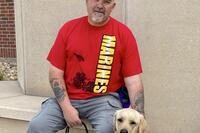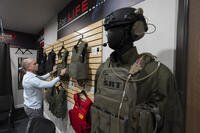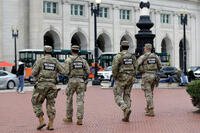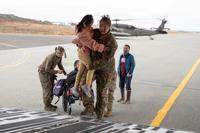NEW YORK -- Cardinal Timothy Dolan, the Archbishop of New York joined the National Guard's top chaplain in Times Square on Wednesday, June 27, to salute the Army's most famous chaplain: New York National Guard Lt. Col. Francis P. Duffy.
Dolan and Chaplain (Brig. Gen.) Kenneth "Ed" Brandt, who also serves as one of the Army's Deputy Chief of Chaplains, marked the anniversary of Duffy's death on June 26, 1932, by laying a wreath at the memorial to Father Duffy erected in Times Square in 1937.
Duffy, a member of the New York National Guard's 69th Infantry Regiment, was famed as leader and counselor to the Irish-Americans who served in the unit during World War I. He was also known for his good works at home.
When he died an estimated 50,000 New Yorkers lined the funeral procession route from St. Patrick's Cathedral to his burial site in the Bronx.
"Father Duffy was one of those chaplains who allowed his ministry to follow the Soldiers," Brandt said. "In true chaplain fashion he cared about the person more than the ideology. Father Duffy served all, regardless of religion, seeing each person as a child of God."
"I am so grateful that in the middle of this part of the world, New York City, would stand the statue of the priest who exemplified so radiantly that love of God and love of country," Dolan said.
In Charles Keck's bronze effigy of the Soldier-priest, he depicts Duffy, nearly eight feet tall, in military garb and bible in hand. The statue is set on a pedestal backed by a green granite Celtic cross, more than 17 feet tall.
In a 1940 war movie, "The Fighting 69th" actor Pat O'Brien portrayed Duffy.
"Millions of folks pass through Times Square every year to feel its energy, experience its excitement and witness its grandeur," said Lt. Col. Don Makay, commander of the 1st Battalion, 69th Infantry.
"They also get a chance to see some heroes; you got Spiderman over there, Batman, Elmo and even Mickey Mouse. However there is one hero who is out here regardless of the weather and the season, who stands here and watches over the epicenter of the social universe here in Times Square -- Father Francis Duffy," Makay said.
Dolan, Brandt and Makay joined World War I Centennial Commissioner Libby O'Connell to honor Duffy's place in Army history.
"Today we honor one of our own who lived that call (to duty) with guts and gusto to bring alive the love, mercy and compassion of a living God to service members who answered the call to wear the fabric of our nation," Brandt said.
When the war ended, Duffy returned to New York City where he remained in the National Guard and served his parish at the Holy Cross Church in Hell's Kitchen, just blocks from Times Square and the city's theater district.
Duffy first served as an Army chaplain for returning veterans of the Spanish-American War at Montauk Point, Long Island in 1898. He went on to become chaplain of the National Guard's 69th Infantry Regiment in 1914 while serving as pastor of Our Savior Parish in the Bronx.
The regiment had earned its fame as part of the Irish Brigade during the Civil War and was reportedly dubbed the "Fighting 69th" by Confederate General Robert E. Lee. In Duffy's time, the regiment was still made up of the Irish Catholic immigrant community.
Duffy accompanied the regiment to the Mexican border in 1916 when National Guard troops were mobilized to stop cross border raids by Mexican revolutionary leader Pancho Villa.
Returning in the spring of 1917, Duffy and the 69th mobilized for World War I and became the 165th Infantry Regiment, destined for service with the newly formed 42nd "Rainbow" Division.
He is the most decorated chaplain in Army history and Duffy's wartime service set the standard for the military chaplains who would follow, Makay said.
"It was 100 years ago this year that Father Duffy experienced the defining moments of his life," Makay said, "not preaching from a pulpit or evangelizing in the streets, but projecting confidence, inspiration and calm for the Soldiers of the 69th Infantry who were facing some of the most barbaric fighting in a very bloody and industrialized war in France."
"The regiment was ninety percent first and second generation Irish and the other ten percent were a mix of country boys and immigrants from all over," O'Connell said, "They were all equal in his eyes."
In his memoir, Duffy wrote that he didn't care about the Soldiers' place of birth or ethnic background, but liked to think they were all "Irish by adoption, Irish by association, or Irish by conviction."
He received the Distinguished Service Cross and Distinguished Service Medal, along with the Legion d'Honneur and Croix de Guerre from French military leaders.
"He was a muddy boots chaplain," Makay said, "whose fame was derived not from his rank or position, but from his willingness to endure the same risks as the Soldiers."
First Lt. George Benz, who served with Duffy in the trenches with Company I, in May 1918 recalled seeing the priest hearing the confession of "a little Irish private [while] the moan of the shells whizzing through the air furnished the doleful [background] music. ... When men were facing and some meeting death every few minutes, you'd find Father Duffy. He was more than a father confessor to the men--he was their friend, their pal."
"Father Duffy," Dolan said, "thank you for what you did, thank you for who you are, thank you for the memories you bring, thank you, for through you, you allow us to praise God for the gift of chaplains to our armed services, who follow your example in their love for God and love for country."















